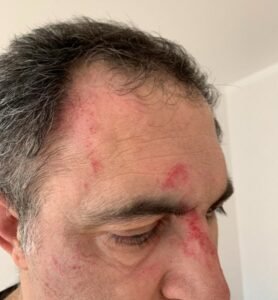The Turkish government continued to muzzle the press in 2020 in a variety of ways, including imprisoning journalists, eliminating media outlets, overseeing the purchase of media brands by pro-government conglomerates and using regulatory authorities to exert financial pressure.
Journalism is still associated with terrorism in Turkey, and journalistic work is used as evidence against journalists in the overwhelming majority of convictions. In most of the trials, the evidence is typically made up of social media posts, news stories, articles and TV broadcasts. According to the Stockholm Center for Freedom’s “Jailed and Wanted Journalists in Turkey” database, 175 journalists are behind bars and 167 are wanted and either in exile or at large. Media freedom watchdog Reporters Without Borders (RSF) describes Turkey as “the world’s biggest jailer of professional journalists.”
Yet, according to a report by the Center for American Progress (CAP), despite heavy censorship, two key trends undercut President Recep Tayyip Erdoğan’s efforts to control the media landscape: “rising distrust toward the media and increasing fragmentation in the ways that Turks get their news.”
Cognizant of these trends, the Turkish government passed a Social Media Law, which came into force on October 1, that poses an immediate threat of extensive censorship of the Internet. This is particularly worrisome for — following the state-led takeover of the mainstream media –- social media platforms as well as online news sites, which remain among the last bastions of critical journalism in Turkey.
Even before the new law went into effect, Turkish police investigated 14,186 social media accounts in the first seven months of 2020, taking legal action against 6,743 of them on charges of spreading terrorist propaganda, inciting the public to hatred and enmity, instilling fear in and causing panic among the public or containing provocative content.
Here is some of the most important news from 2020 in the field of press freedom:
Jailed journalists die of cancer after belated release from prison
Journalist Mevlüt Öztaş, who was diagnosed with pancreatic cancer while in jail, died in July after his belated release from prison despite a medical report recommending it.
TV director Fatih Terzioğlu, 40, who was diagnosed with stomach cancer during his 21-month incarceration on terrorism charges, died in August following his release from prison in mid-July after an intensive social media campaign. More..
Turkish courts consider publishing leaked state documents an act of terrorism, sentence journalist Mehmet Baransu to a total of 36 years
A Mersin court that handed down a prison sentence of 19 years, six months to jailed investigative journalist Mehmet Baransu on three separate charges said in its reasoned decision that he had published classified information with “terror motives” and not for purposes of journalism.
Baransu was also sentenced to an additional 17 years by an İstanbul court in November for publishing leaked government documents. More..
European rights court rules Turkey violated rights of Turkish journalists
The European Court of Human Rights (ECtHR) ruled that Turkey violated the right to liberty and security as well as the right to freedom of expression of journalist Ahmet Şık, who was kept in pre-trial detention for 14 months in Turkey.
The ECtHR made a similar ruling about a group of journalists and executives from the anti-government Cumhuriyet daily who stood trial on terrorism charges in the country. More..
Turkey fined social media giants for refusal to comply with controversial law
Turkey imposed a first round of fines, TL 30 million ($3.8 million) each, on social media giants such as Facebook, Twitter and YouTube for failing to comply with a new law. On November 4, the companies were slapped with a second round of fines of TL 10 million ($1.17 million) for the same reason. More…
News outlets critical of the government slapped with high and disproportionate fines
Turkey’s broadcasting watchdog, the Radio and Television Supreme Council (RTÜK), imposed fines on TV stations critical of the ruling Justice and Development Party (AKP) totaling 25 times the amount it imposed on pro-government TV stations in 2020. RTÜK had received 102,500 complaints about the staunchly pro-government ATV in 2020; however, ATV was punished only twice, once with an administrative fine for violating laws protecting the family, and again as a warning for the inappropriate use of Turkish, the mildest form of RTÜK sanctions. In addition, RTÜK failed to process any of the complaints filed against pro-government TV stations A Haber, Kanal 7, TV Net and TGRT News in 2020 and did not impose any fines on them. More…
Turkish writer Ahmet Altan held in prison for over 1,500 days without a shred of credible evidence
The Turkish government has held novelist and journalist Ahmet Altan in İstanbul’s Silivri Prison for 1,500 days without a shred of credible evidence that he has committed any crime other than to express critical opinions, Emma Sinclair-Webb from Human Rights Watch said.
Altan topped the December ranking of the One Free Press Coalition’s “10 Most Urgent” list of press freedom cases, the organization announced in a press release. More..
Exiled journalist Can Dündar’s assets seized, gets 27 years in prison
Exiled journalist Can Dündar was handed down a 27-year, six-month prison sentence in a trial concerning a news report on National Intelligence Organization (MIT) trucks transporting arms to rebels in Syria.
The Özgürüz website, which is run by Dündar, was cut from access in Turkey by the Radio and Television Supreme Council (RTÜK). A Turkish court also ruled to seized Dündar’s assets and declared him a fugitive in October. More…
Appeals court upholds life sentences for 4 defendants including journalist Karaca, former MP İşbilen
A regional court of appeals in Ankara has ruled to uphold the aggravated life sentences of four defendants — journalist Hidayet Karaca, former lawmaker İlhan İşbilen, Fethullah Gülen’s cousin Kazım Avcı and Alaeddin Kaya, former owner of the Zaman newspaper. More…
4 journalists arrested for reporting on Kurdish villagers allegedly thrown from military helicopter
Four journalists who reported on two Kurdish villagers who had allegedly been thrown out of a military helicopter were arrested in October. The villagers were in fact assaulted by a mob of more than 100 soldiers, a report by independent deputy and investigative journalist Ahmet Şık had later revealed. More..
Journalists convicted over reports on Turkish black op in Libya
A Turkish court in September convicted five journalists over their reports on a Turkish intelligence officer killed in Libya and sentenced them to more than three years in prison but released them pending appeal. More..

Sweden-based Turkish journalist Abdullah Bozkurt was attacked yesterday near his home in Stockholm, hospitalizing him for injuries sustained. Bozkurt and his team of journalists in Sweden run Nordic Monitor news web site which provides exclusive and critical coverage on Turkey and exposes the clandestine activities of the notorious Turkish intelligence agency. More..
İstanbul court upholds prison sentences of journalists from Turkey’s pro-opposition Sözcü daily
The prison sentences of nine journalists from Turkey’s pro-opposition Sözcü daily who were charged with supporting the Gülen movement have been upheld by the İstanbul Regional Appeals Court. More..
Journalist Büşra Erdal denied release despite eligibility for parole
Journalist Büşra Erdal has been denied release from prison although she has been eligible for parole since March 30, according to Ömer Faruk Gergerlioğlu, a prominent human rights activist and a deputy from the pro-Kurdish Peoples’ Democratic Party (HDP). More..
Turkish TV station closes down due to gov’t pressure 26 days after launch
Private Turkish television station Olay TV closed down on December 25, only 26 days after it started broadcasting, due to intense pressure from Turkey’s Justice and Development Party (AKP) government. More..
Female journalists in Turkey face discrimination and harassment at work, says media association
Female journalists in Turkey face problems at work, ranging from unequal pay to sexual harassment, most frequently seen in local media outlets, according to a report by the Media Research Association (MEDAR). More..
Turkish gov’t uses TRT as a weapon to spread its censorship to YouTube
After taking full control of traditional media, Turkish President Recep Tayyip Erdoğan began silencing dissenting voices on YouTube through Turkey’s public broadcaster TRT, which abused the platform’s community guidelines and copyright policy to secure the closure of dozens of channels and the removal of thousands of videos. More..




















[…] The Year in Review: Press Freedom […]